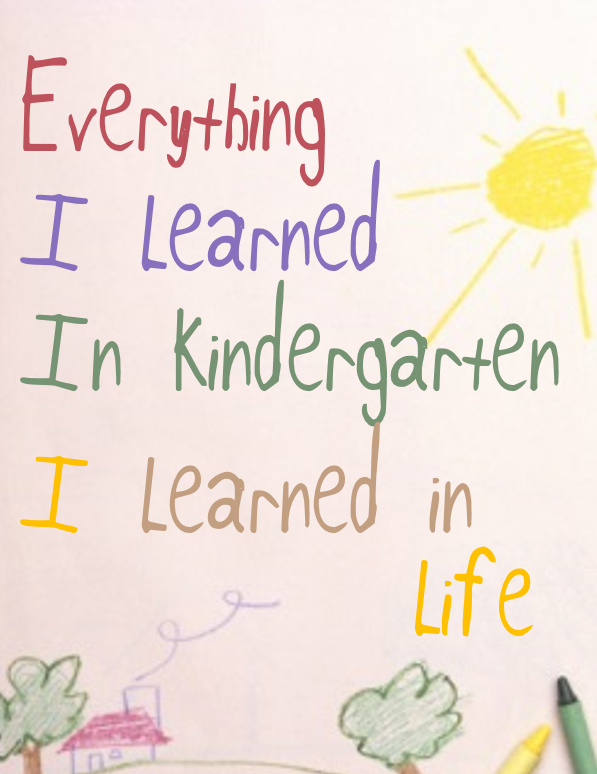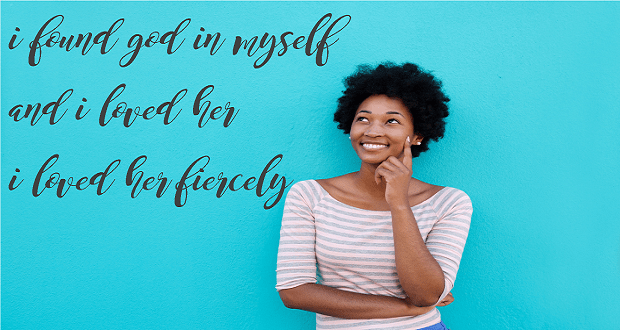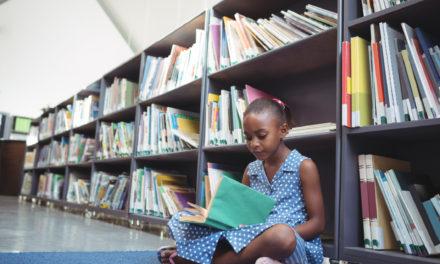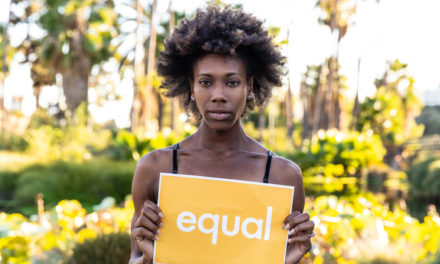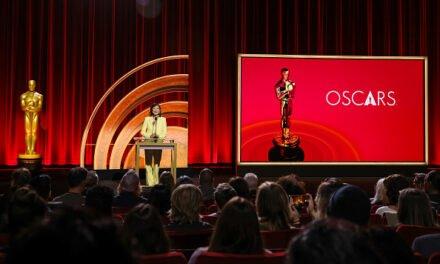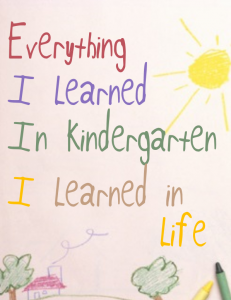 I remember seeing hilarious, and often brilliant, posters as a kid that listed off funny things about (adult) life that were initially learned as children. Although I have not yet read it, Robert Fulghum has written an entire book, All I Really Need To Know I Learned in Kindergarten, with insights from childhood that are still relevant as adults. Like, “Hide-and-seek grown up style. Wanting to hide. Needing to be sought. Confused about being found” and “goldfish and hamster and white mice and even the little seed in the Styrofaom cup- they all die. So do we.”
I remember seeing hilarious, and often brilliant, posters as a kid that listed off funny things about (adult) life that were initially learned as children. Although I have not yet read it, Robert Fulghum has written an entire book, All I Really Need To Know I Learned in Kindergarten, with insights from childhood that are still relevant as adults. Like, “Hide-and-seek grown up style. Wanting to hide. Needing to be sought. Confused about being found” and “goldfish and hamster and white mice and even the little seed in the Styrofaom cup- they all die. So do we.”
Several weeks ago, my sister sent me a photo of my 4-year-old nephew Noah before his first day of pre-school and my immediate reaction was “his life will never be the same.” Until this day, his life has been largely free from the demands of schedules and rules. He sleeps until his body is ready to wake up and if he’s tired again during the day, he sleeps again. So far his major life decisions fluctuate between what movies to watch, what games to play, what books to read or what snack to eat (if you sense bitter jealousy, you are correct).
When my sister asked Noah how his first day of school was, he said, “It was good. But I want to stay home tomorrow.” There was noticeable unease about this new world he’s been thrown into. He liked it, but the newness of playing with others, following rules, and accepting authority did not fit into his picture of the world so far. And now for the next 13 years, much of what he will learn about himself and the world will be closely tied to his experience in the public school system. His friends, teachers, books, and nature of the school will influence his beliefs, values, interests and relationships long into his life.
Sociologists call these larger social structures that shape individual life, “agents of socialization.” Families, schools, churches, and jobs are all agents of socialization from which we learn our various patterns of thought and behavior. Unlike our culture’s insistence on individuality and personal freedom, sociologists emphasize the ways we become products of our environment. Who my nephew grows up to be, will largely be a reflection of the organizations he’s a part of.
The second thought that crossed my mind was how this process of being shaped by organizations is never ending. Noah will likely graduate high school, hopefully enroll in college, and one day find a career, all of which will shape what kind of person he becomes. This made me see myself in the photo. Like Noah, I also have a picture of my first day of school. Like Noah, those early days were overwhelming and confusing as I adjusted to this new life. I am who I am today because I have been shaped by two decades of public education. And today, like Noah, I am still being shaped by the organizations I spend the most time with. But unlike Noah, I now have a little more freedom in which organizations I choose to influence me. I do not deny that organizations and groups of people will inevitably shape who I’m becoming but instead, I embrace the reality and am more conscious of how and by whom I will be shaped.
It is a humbling and healthy perspective to realize the limits of one’s freedom. If it’s true that you are a product of the organizations you spend the most time with, you no longer can take all the credit for your greatness or absorb all the blame for your faults. Like all the children who just started a new school year, you are still being influenced daily by your coworkers, managers, and organizational philosophy. Realizing that organizations not only produce products, but also people, is the first step to taking control of the ways you are being shaped. In other words, seeing yourself again as a kindergartner will make you a more informed student about the schools of life you choose to attend.
 About the author: Travis L. Jones is the Director of Innovation and New Ventures at The Winters Group. He is an avid traveler, having spent time in over 20 countries on 5 continents. He is passionate about studying the redeeming qualities of cultures as a bridge to creating a better world.
About the author: Travis L. Jones is the Director of Innovation and New Ventures at The Winters Group. He is an avid traveler, having spent time in over 20 countries on 5 continents. He is passionate about studying the redeeming qualities of cultures as a bridge to creating a better world.

